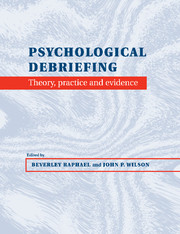Book contents
- Frontmatter
- Contents
- List of contributors
- Introduction and overview: Key issues in the conceptualization of debriefing
- Part I Key conceptual framework of debriefing
- Part II Debriefing: models, research and practice
- Part III Adaptations of debriefing models
- Part IV Debriefing overview and future directions
- Conclusion: debriefing – science, belief and wisdom
- Index
Conclusion: debriefing – science, belief and wisdom
Published online by Cambridge University Press: 06 January 2010
- Frontmatter
- Contents
- List of contributors
- Introduction and overview: Key issues in the conceptualization of debriefing
- Part I Key conceptual framework of debriefing
- Part II Debriefing: models, research and practice
- Part III Adaptations of debriefing models
- Part IV Debriefing overview and future directions
- Conclusion: debriefing – science, belief and wisdom
- Index
Summary
Introduction
This volume combines the scientific face of debriefing and the powerfulness of belief, and reflects the wisdom of its contributors. Often these three elements are not dissected out but rather drive the presentations and the work of authors. It is useful to review each of these themes, and consider where, after reading these contributions and considering other available work in this field, our conclusions must lie. For ultimately how and if debriefing is taken forward will need to encompass these issues.
The science
Reviews presented by the contributors to this volume describe many of the available scientific studies and as well present their own substantial research efforts. They evaluate the effectiveness of debriefing broadly, as applied to: individuals affected by accident, illness or other life stresses; groups affected by disasters or emergency work; or as an element of a workplace or occupational health programme.
The findings reported include those provided by powerful advocates of debriefing, for instance Mitchell, and those whose research has shown no benefits, possibly even negative effects.
These may be usefully summarized as follows.
Studies investigating individualized one-off interventions
Bisson et al.'s (1997) study of psychological debriefing of victims of acute burns trauma showed that the debriefing group were worse at follow-up than the controls, although it must be noted that their burn trauma was more severe and their initial symptomatology higher.
- Type
- Chapter
- Information
- Psychological DebriefingTheory, Practice and Evidence, pp. 351 - 359Publisher: Cambridge University PressPrint publication year: 2000
Accessibility information
- 8
- Cited by

